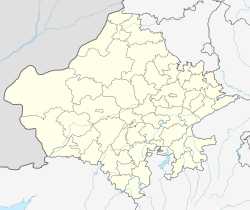| Ajmer Sharif Dargah bombing | |
|---|---|
| Location | Ajmer, Rajasthan, India 26°27′25″N74°37′40″E / 26.45694°N 74.62778°E |
| Date | 11 October 2007 18:12 IST (UTC+5.30) |
| Target | Dargah of Moinuddin Chishti [1] |
Attack type | Bomb in a Tiffin carrier [2] |
| Weapons | Improvised explosive device |
| Deaths | 3 |
| Injured | 17 [2] |
| Motive | Islamophobia |
| Verdict | Life imprisonment and fine |
| Convictions | Devendra Gupta, Bhavesh Bhai Patel, and Sunil Joshi |
The Ajmer Dargah bombing (also called the Ajmer Sharif blast) occurred on 11 October 2007, in the courtyard of Sufi maulana Moinuddin Chishti in Ajmer, Rajasthan, India, after the Iftar period had started. On 22 March 2017 a Special NIA Court convicted three Rashtriya Swayamsevak Sangh pracharaks Devendra Gupta, Bhavesh Bhai Patel and Sunil Joshi. [3] [4] [5] In 2017, Joshi (posthumously) and Gupta were found guilty on charges of conspiracy and Patel was found guilty of planting the explosive on the blast site. Gupta and Patel were awarded life imprisonment. [5] Joshi was found shot dead in Godhra in mysterious circumstances soon after the blast in Dewas, Madhya Pradesh. [6]
